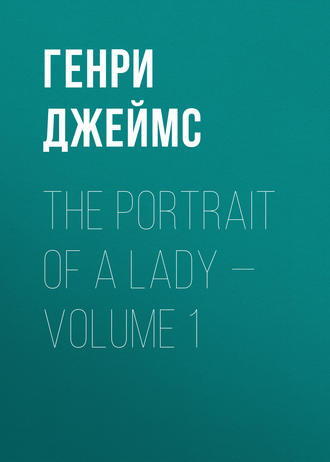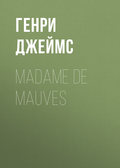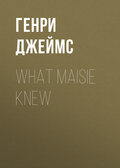
Генри Джеймс
The Portrait of a Lady — Volume 1
While Isabel’s host exerted himself to entertain her in this somewhat confidential fashion she looked occasionally at Madame Merle, who met her eyes with an inattentive smile in which, on this occasion, there was no infelicitous intimation that our heroine appeared to advantage. Madame Merle eventually proposed to the Countess Gemini that they should go into the garden, and the Countess, rising and shaking out her feathers, began to rustle toward the door. “Poor Miss Archer!” she exclaimed, surveying the other group with expressive compassion. “She has been brought quite into the family.”
“Miss Archer can certainly have nothing but sympathy for a family to which you belong,” Mr. Osmond answered, with a laugh which, though it had something of a mocking ring, had also a finer patience.
“I don’t know what you mean by that! I’m sure she’ll see no harm in me but what you tell her. I’m better than he says, Miss Archer,” the Countess went on. “I’m only rather an idiot and a bore. Is that all he has said? Ah then, you keep him in good-humour. Has he opened on one of his favourite subjects? I give you notice that there are two or three that he treats à fond. In that case you had better take off your bonnet.”
“I don’t think I know what Mr. Osmond’s favourite subjects are,” said Isabel, who had risen to her feet.
The Countess assumed for an instant an attitude of intense meditation, pressing one of her hands, with the finger-tips gathered together, to her forehead. “I’ll tell you in a moment. One’s Machiavelli; the other’s Vittoria Colonna; the next is Metastasio.”
“Ah, with me,” said Madame Merle, passing her arm into the Countess Gemini’s as if to guide her course to the garden, “Mr. Osmond’s never so historical.”
“Oh you,” the Countess answered as they moved away, “you yourself are Machiavelli—you yourself are Vittoria Colonna!”
“We shall hear next that poor Madame Merle is Metastasio!” Gilbert Osmond resignedly sighed.
Isabel had got up on the assumption that they too were to go into the garden; but her host stood there with no apparent inclination to leave the room, his hands in the pockets of his jacket and his daughter, who had now locked her arm into one of his own, clinging to him and looking up while her eyes moved from his own face to Isabel’s. Isabel waited, with a certain unuttered contentedness, to have her movements directed; she liked Mr. Osmond’s talk, his company: she had what always gave her a very private thrill, the consciousness of a new relation. Through the open doors of the great room she saw Madame Merle and the Countess stroll across the fine grass of the garden; then she turned, and her eyes wandered over the things scattered about her. The understanding had been that Mr. Osmond should show her his treasures; his pictures and cabinets all looked like treasures. Isabel after a moment went toward one of the pictures to see it better; but just as she had done so he said to her abruptly: “Miss Archer, what do you think of my sister?”
She faced him with some surprise. “Ah, don’t ask me that—I’ve seen your sister too little.”
“Yes, you’ve seen her very little; but you must have observed that there is not a great deal of her to see. What do you think of our family tone?” he went on with his cool smile. “I should like to know how it strikes a fresh, unprejudiced mind. I know what you’re going to say—you’ve had almost no observation of it. Of course this is only a glimpse. But just take notice, in future, if you have a chance. I sometimes think we’ve got into a rather bad way, living off here among things and people not our own, without responsibilities or attachments, with nothing to hold us together or keep us up; marrying foreigners, forming artificial tastes, playing tricks with our natural mission. Let me add, though, that I say that much more for myself than for my sister. She’s a very honest lady—more so than she seems. She’s rather unhappy, and as she’s not of a serious turn she doesn’t tend to show it tragically: she shows it comically instead. She has got a horrid husband, though I’m not sure she makes the best of him. Of course, however, a horrid husband’s an awkward thing. Madame Merle gives her excellent advice, but it’s a good deal like giving a child a dictionary to learn a language with. He can look out the words, but he can’t put them together. My sister needs a grammar, but unfortunately she’s not grammatical. Pardon my troubling you with these details; my sister was very right in saying you’ve been taken into the family. Let me take down that picture; you want more light.”
He took down the picture, carried it toward the window, related some curious facts about it. She looked at the other works of art, and he gave her such further information as might appear most acceptable to a young lady making a call on a summer afternoon. His pictures, his medallions and tapestries were interesting; but after a while Isabel felt the owner much more so, and independently of them, thickly as they seemed to overhang him. He resembled no one she had ever seen; most of the people she knew might be divided into groups of half a dozen specimens. There were one or two exceptions to this; she could think for instance of no group that would contain her aunt Lydia. There were other people who were, relatively speaking, original—original, as one might say, by courtesy such as Mr. Goodwood, as her cousin Ralph, as Henrietta Stackpole, as Lord Warburton, as Madame Merle. But in essentials, when one came to look at them, these individuals belonged to types already present to her mind. Her mind contained no class offering a natural place to Mr. Osmond—he was a specimen apart. It was not that she recognised all these truths at the hour, but they were falling into order before her. For the moment she only said to herself that this “new relation” would perhaps prove her very most distinguished. Madame Merle had had that note of rarity, but what quite other power it immediately gained when sounded by a man! It was not so much what he said and did, but rather what he withheld, that marked him for her as by one of those signs of the highly curious that he was showing her on the underside of old plates and in the corner of sixteenth-century drawings: he indulged in no striking deflections from common usage, he was an original without being an eccentric. She had never met a person of so fine a grain. The peculiarity was physical, to begin with, and it extended to impalpabilities. His dense, delicate hair, his overdrawn, retouched features, his clear complexion, ripe without being coarse, the very evenness of the growth of his beard, and that light, smooth slenderness of structure which made the movement of a single one of his fingers produce the effect of an expressive gesture—these personal points struck our sensitive young woman as signs of quality, of intensity, somehow as promises of interest. He was certainly fastidious and critical; he was probably irritable. His sensibility had governed him—possibly governed him too much; it had made him impatient of vulgar troubles and had led him to live by himself, in a sorted, sifted, arranged world, thinking about art and beauty and history. He had consulted his taste in everything—his taste alone perhaps, as a sick man consciously incurable consults at last only his lawyer: that was what made him so different from every one else. Ralph had something of this same quality, this appearance of thinking that life was a matter of connoisseurship; but in Ralph it was an anomaly, a kind of humorous excrescence, whereas in Mr. Osmond it was the keynote, and everything was in harmony with it. She was certainly far from understanding him completely; his meaning was not at all times obvious. It was hard to see what he meant for instance by speaking of his provincial side—which was exactly the side she would have taken him most to lack. Was it a harmless paradox, intended to puzzle her? or was it the last refinement of high culture? She trusted she should learn in time; it would be very interesting to learn. If it was provincial to have that harmony, what then was the finish of the capital? And she could put this question in spite of so feeling her host a shy personage; since such shyness as his—the shyness of ticklish nerves and fine perceptions—was perfectly consistent with the best breeding. Indeed it was almost a proof of standards and touchstones other than the vulgar: he must be so sure the vulgar would be first on the ground. He wasn’t a man of easy assurance, who chatted and gossiped with the fluency of a superficial nature; he was critical of himself as well as of others, and, exacting a good deal of others, to think them agreeable, probably took a rather ironical view of what he himself offered: a proof into the bargain that he was not grossly conceited. If he had not been shy he wouldn’t have effected that gradual, subtle, successful conversion of it to which she owed both what pleased her in him and what mystified her. If he had suddenly asked her what she thought of the Countess Gemini, that was doubtless a proof that he was interested in her; it could scarcely be as a help to knowledge of his own sister. That he should be so interested showed an enquiring mind; but it was a little singular he should sacrifice his fraternal feeling to his curiosity. This was the most eccentric thing he had done.
There were two other rooms, beyond the one in which she had been received, equally full of romantic objects, and in these apartments Isabel spent a quarter of an hour. Everything was in the last degree curious and precious, and Mr. Osmond continued to be the kindest of ciceroni as he led her from one fine piece to another and still held his little girl by the hand. His kindness almost surprised our young friend, who wondered why he should take so much trouble for her; and she was oppressed at last with the accumulation of beauty and knowledge to which she found herself introduced. There was enough for the present; she had ceased to attend to what he said; she listened to him with attentive eyes, but was not thinking of what he told her. He probably thought her quicker, cleverer in every way, more prepared, than she was. Madame Merle would have pleasantly exaggerated; which was a pity, because in the end he would be sure to find out, and then perhaps even her real intelligence wouldn’t reconcile him to his mistake. A part of Isabel’s fatigue came from the effort to appear as intelligent as she believed Madame Merle had described her, and from the fear (very unusual with her) of exposing—not her ignorance; for that she cared comparatively little—but her possible grossness of perception. It would have annoyed her to express a liking for something he, in his superior enlightenment, would think she oughtn’t to like; or to pass by something at which the truly initiated mind would arrest itself. She had no wish to fall into that grotesqueness—in which she had seen women (and it was a warning) serenely, yet ignobly, flounder. She was very careful therefore as to what she said, as to what she noticed or failed to notice; more careful than she had ever been before.
They came back into the first of the rooms, where the tea had been served; but as the two other ladies were still on the terrace, and as Isabel had not yet been made acquainted with the view, the paramount distinction of the place, Mr. Osmond directed her steps into the garden without more delay. Madame Merle and the Countess had had chairs brought out, and as the afternoon was lovely the Countess proposed they should take their tea in the open air. Pansy therefore was sent to bid the servant bring out the preparations. The sun had got low, the golden light took a deeper tone, and on the mountains and the plain that stretched beneath them the masses of purple shadow glowed as richly as the places that were still exposed. The scene had an extraordinary charm. The air was almost solemnly still, and the large expanse of the landscape, with its garden-like culture and nobleness of outline, its teeming valley and delicately-fretted hills, its peculiarly human-looking touches of habitation, lay there in splendid harmony and classic grace. “You seem so well pleased that I think you can be trusted to come back,” Osmond said as he led his companion to one of the angles of the terrace.
“I shall certainly come back,” she returned, “in spite of what you say about its being bad to live in Italy. What was that you said about one’s natural mission? I wonder if I should forsake my natural mission if I were to settle in Florence.”
“A woman’s natural mission is to be where she’s most appreciated.”
“The point’s to find out where that is.”
“Very true—she often wastes a great deal of time in the enquiry. People ought to make it very plain to her.”
“Such a matter would have to be made very plain to me,” smiled Isabel.
“I’m glad, at any rate, to hear you talk of settling. Madame Merle had given me an idea that you were of a rather roving disposition. I thought she spoke of your having some plan of going round the world.”
“I’m rather ashamed of my plans; I make a new one every day.”
“I don’t see why you should be ashamed; it’s the greatest of pleasures.”
“It seems frivolous, I think,” said Isabel. “One ought to choose something very deliberately, and be faithful to that.”
“By that rule then, I’ve not been frivolous.”
“Have you never made plans?”
“Yes, I made one years ago, and I’m acting on it to-day.”
“It must have been a very pleasant one,” Isabel permitted herself to observe.
“It was very simple. It was to be as quiet as possible.”
“As quiet?” the girl repeated.
“Not to worry—not to strive nor struggle. To resign myself. To be content with little.” He spoke these sentences slowly, with short pauses between, and his intelligent regard was fixed on his visitor’s with the conscious air of a man who has brought himself to confess something.
“Do you call that simple?” she asked with mild irony.
“Yes, because it’s negative.”
“Has your life been negative?”
“Call it affirmative if you like. Only it has affirmed my indifference. Mind you, not my natural indifference—I had none. But my studied, my wilful renunciation.”
She scarcely understood him; it seemed a question whether he were joking or not. Why should a man who struck her as having a great fund of reserve suddenly bring himself to be so confidential? This was his affair, however, and his confidences were interesting. “I don’t see why you should have renounced,” she said in a moment.
“Because I could do nothing. I had no prospects, I was poor, and I was not a man of genius. I had no talents even; I took my measure early in life. I was simply the most fastidious young gentleman living. There were two or three people in the world I envied—the Emperor of Russia, for instance, and the Sultan of Turkey! There were even moments when I envied the Pope of Rome—for the consideration he enjoys. I should have been delighted to be considered to that extent; but since that couldn’t be I didn’t care for anything less, and I made up my mind not to go in for honours. The leanest gentleman can always consider himself, and fortunately I was, though lean, a gentleman. I could do nothing in Italy—I couldn’t even be an Italian patriot. To do that I should have had to get out of the country; and I was too fond of it to leave it, to say nothing of my being too well satisfied with it, on the whole, as it then was, to wish it altered. So I’ve passed a great many years here on that quiet plan I spoke of. I’ve not been at all unhappy. I don’t mean to say I’ve cared for nothing; but the things I’ve cared for have been definite—limited. The events of my life have been absolutely unperceived by any one save myself; getting an old silver crucifix at a bargain (I’ve never bought anything dear, of course), or discovering, as I once did, a sketch by Correggio on a panel daubed over by some inspired idiot.”
This would have been rather a dry account of Mr. Osmond’s career if Isabel had fully believed it; but her imagination supplied the human element which she was sure had not been wanting. His life had been mingled with other lives more than he admitted; naturally she couldn’t expect him to enter into this. For the present she abstained from provoking further revelations; to intimate that he had not told her everything would be more familiar and less considerate than she now desired to be—would in fact be uproariously vulgar. He had certainly told her quite enough. It was her present inclination, however, to express a measured sympathy for the success with which he had preserved his independence. “That’s a very pleasant life,” she said, “to renounce everything but Correggio!”
“Oh, I’ve made in my way a good thing of it. Don’t imagine I’m whining about it. It’s one’s own fault if one isn’t happy.”
This was large; she kept down to something smaller. “Have you lived here always?”
“No, not always. I lived a long time at Naples, and many years in Rome. But I’ve been here a good while. Perhaps I shall have to change, however; to do something else. I’ve no longer myself to think of. My daughter’s growing up and may very possibly not care so much for the Correggios and crucifixes as I. I shall have to do what’s best for Pansy.”
“Yes, do that,” said Isabel. “She’s such a dear little girl.”
“Ah,” cried Gilbert Osmond beautifully, “she’s a little saint of heaven! She is my great happiness!”
CHAPTER XXV
While this sufficiently intimate colloquy (prolonged for some time after we cease to follow it) went forward Madame Merle and her companion, breaking a silence of some duration, had begun to exchange remarks. They were sitting in an attitude of unexpressed expectancy; an attitude especially marked on the part of the Countess Gemini, who, being of a more nervous temperament than her friend, practised with less success the art of disguising impatience. What these ladies were waiting for would not have been apparent and was perhaps not very definite to their own minds. Madame Merle waited for Osmond to release their young friend from her tête-à-tête, and the Countess waited because Madame Merle did. The Countess, moreover, by waiting, found the time ripe for one of her pretty perversities. She might have desired for some minutes to place it. Her brother wandered with Isabel to the end of the garden, to which point her eyes followed them.
“My dear,” she then observed to her companion, “you’ll excuse me if I don’t congratulate you!”
“Very willingly, for I don’t in the least know why you should.”
“Haven’t you a little plan that you think rather well of?” And the Countess nodded at the sequestered couple.
Madame Merle’s eyes took the same direction; then she looked serenely at her neighbour. “You know I never understand you very well,” she smiled.
“No one can understand better than you when you wish. I see that just now you don’t wish.”
“You say things to me that no one else does,” said Madame Merle gravely, yet without bitterness.
“You mean things you don’t like? Doesn’t Osmond sometimes say such things?”
“What your brother says has a point.”
“Yes, a poisoned one sometimes. If you mean that I’m not so clever as he you mustn’t think I shall suffer from your sense of our difference. But it will be much better that you should understand me.”
“Why so?” asked Madame Merle. “To what will it conduce?”
“If I don’t approve of your plan you ought to know it in order to appreciate the danger of my interfering with it.”
Madame Merle looked as if she were ready to admit that there might be something in this; but in a moment she said quietly: “You think me more calculating than I am.”
“It’s not your calculating I think ill of; it’s your calculating wrong. You’ve done so in this case.”
“You must have made extensive calculations yourself to discover that.”
“No, I’ve not had time. I’ve seen the girl but this once,” said the Countess, “and the conviction has suddenly come to me. I like her very much.”
“So do I,” Madame Merle mentioned.
“You’ve a strange way of showing it.”
“Surely I’ve given her the advantage of making your acquaintance.”
“That indeed,” piped the Countess, “is perhaps the best thing that could happen to her!”
Madame Merle said nothing for some time. The Countess’s manner was odious, was really low; but it was an old story, and with her eyes upon the violet slope of Monte Morello she gave herself up to reflection. “My dear lady,” she finally resumed, “I advise you not to agitate yourself. The matter you allude to concerns three persons much stronger of purpose than yourself.”
“Three persons? You and Osmond of course. But is Miss Archer also very strong of purpose?”
“Quite as much so as we.”
“Ah then,” said the Countess radiantly, “if I convince her it’s her interest to resist you she’ll do so successfully!”
“Resist us? Why do you express yourself so coarsely? She’s not exposed to compulsion or deception.”
“I’m not sure of that. You’re capable of anything, you and Osmond. I don’t mean Osmond by himself, and I don’t mean you by yourself. But together you’re dangerous—like some chemical combination.”
“You had better leave us alone then,” smiled Madame Merle.
“I don’t mean to touch you—but I shall talk to that girl.”
“My poor Amy,” Madame Merle murmured, “I don’t see what has got into your head.”
“I take an interest in her—that’s what has got into my head. I like her.”
Madame Merle hesitated a moment. “I don’t think she likes you.”
The Countess’s bright little eyes expanded and her face was set in a grimace. “Ah, you are dangerous—even by yourself!”
“If you want her to like you don’t abuse your brother to her,” said Madame Merle.
“I don’t suppose you pretend she has fallen in love with him in two interviews.”
Madame Merle looked a moment at Isabel and at the master of the house. He was leaning against the parapet, facing her, his arms folded; and she at present was evidently not lost in the mere impersonal view, persistently as she gazed at it. As Madame Merle watched her she lowered her eyes; she was listening, possibly with a certain embarrassment, while she pressed the point of her parasol into the path. Madame Merle rose from her chair. “Yes, I think so!” she pronounced.
The shabby footboy, summoned by Pansy—he might, tarnished as to livery and quaint as to type, have issued from some stray sketch of old-time manners, been “put in” by the brush of a Longhi or a Goya—had come out with a small table and placed it on the grass, and then had gone back and fetched the tea-tray; after which he had again disappeared, to return with a couple of chairs. Pansy had watched these proceedings with the deepest interest, standing with her small hands folded together upon the front of her scanty frock; but she had not presumed to offer assistance. When the tea-table had been arranged, however, she gently approached her aunt.
“Do you think papa would object to my making the tea?”
The Countess looked at her with a deliberately critical gaze and without answering her question. “My poor niece,” she said, “is that your best frock?”
“Ah no,” Pansy answered, “it’s just a little toilette for common occasions.”
“Do you call it a common occasion when I come to see you?—to say nothing of Madame Merle and the pretty lady yonder.”
Pansy reflected a moment, turning gravely from one of the persons mentioned to the other. Then her face broke into its perfect smile. “I have a pretty dress, but even that one’s very simple. Why should I expose it beside your beautiful things?”
“Because it’s the prettiest you have; for me you must always wear the prettiest. Please put it on the next time. It seems to me they don’t dress you so well as they might.”
The child sparingly stroked down her antiquated skirt. “It’s a good little dress to make tea—don’t you think? Don’t you believe papa would allow me?”
“Impossible for me to say, my child,” said the Countess. “For me, your father’s ideas are unfathomable. Madame Merle understands them better. Ask her.”
Madame Merle smiled with her usual grace. “It’s a weighty question—let me think. It seems to me it would please your father to see a careful little daughter making his tea. It’s the proper duty of the daughter of the house—when she grows up.”
“So it seems to me, Madame Merle!” Pansy cried. “You shall see how well I’ll make it. A spoonful for each.” And she began to busy herself at the table.
“Two spoonfuls for me,” said the Countess, who, with Madame Merle, remained for some moments watching her. “Listen to me, Pansy,” the Countess resumed at last. “I should like to know what you think of your visitor.”
“Ah, she’s not mine—she’s papa’s,” Pansy objected.
“Miss Archer came to see you as well,” said Madame Merle.
“I’m very happy to hear that. She has been very polite to me.”
“Do you like her then?” the Countess asked.
“She’s charming—charming,” Pansy repeated in her little neat conversational tone. “She pleases me thoroughly.”
“And how do you think she pleases your father?”
“Ah really, Countess!” murmured Madame Merle dissuasively. “Go and call them to tea,” she went on to the child.
“You’ll see if they don’t like it!” Pansy declared; and departed to summon the others, who had still lingered at the end of the terrace.
“If Miss Archer’s to become her mother it’s surely interesting to know if the child likes her,” said the Countess.
“If your brother marries again it won’t be for Pansy’s sake,” Madame Merle replied. “She’ll soon be sixteen, and after that she’ll begin to need a husband rather than a stepmother.”
“And will you provide the husband as well?”
“I shall certainly take an interest in her marrying fortunately. I imagine you’ll do the same.”
“Indeed I shan’t!” cried the Countess. “Why should I, of all women, set such a price on a husband?”
“You didn’t marry fortunately; that’s what I’m speaking of. When I say a husband I mean a good one.”
“There are no good ones. Osmond won’t be a good one.”
Madame Merle closed her eyes a moment. “You’re irritated just now; I don’t know why,” she presently said. “I don’t think you’ll really object either to your brother’s or to your niece’s marrying, when the time comes for them to do so; and as regards Pansy I’m confident that we shall some day have the pleasure of looking for a husband for her together. Your large acquaintance will be a great help.”
“Yes, I’m irritated,” the Countess answered. “You often irritate me. Your own coolness is fabulous. You’re a strange woman.”
“It’s much better that we should always act together,” Madame Merle went on.
“Do you mean that as a threat?” asked the Countess rising. Madame Merle shook her head as for quiet amusement. “No indeed, you’ve not my coolness!”
Isabel and Mr. Osmond were now slowly coming toward them and Isabel had taken Pansy by the hand. “Do you pretend to believe he’d make her happy?” the Countess demanded.
“If he should marry Miss Archer I suppose he’d behave like a gentleman.”
The Countess jerked herself into a succession of attitudes. “Do you mean as most gentlemen behave? That would be much to be thankful for! Of course Osmond’s a gentleman; his own sister needn’t be reminded of that. But does he think he can marry any girl he happens to pick out? Osmond’s a gentleman, of course; but I must say I’ve never, no, no, never, seen any one of Osmond’s pretensions! What they’re all founded on is more than I can say. I’m his own sister; I might be supposed to know. Who is he, if you please? What has he ever done? If there had been anything particularly grand in his origin—if he were made of some superior clay—I presume I should have got some inkling of it. If there had been any great honours or splendours in the family I should certainly have made the most of them: they would have been quite in my line. But there’s nothing, nothing, nothing. One’s parents were charming people of course; but so were yours, I’ve no doubt. Every one’s a charming person nowadays. Even I’m a charming person; don’t laugh, it has literally been said. As for Osmond, he has always appeared to believe that he’s descended from the gods.”
“You may say what you please,” said Madame Merle, who had listened to this quick outbreak none the less attentively, we may believe, because her eye wandered away from the speaker and her hands busied themselves with adjusting the knots of ribbon on her dress. “You Osmonds are a fine race—your blood must flow from some very pure source. Your brother, like an intelligent man, has had the conviction of it if he has not had the proofs. You’re modest about it, but you yourself are extremely distinguished. What do you say about your niece? The child’s a little princess. Nevertheless,” Madame Merle added, “it won’t be an easy matter for Osmond to marry Miss Archer. Yet he can try.”
“I hope she’ll refuse him. It will take him down a little.”
“We mustn’t forget that he is one of the cleverest of men.”
“I’ve heard you say that before, but I haven’t yet discovered what he has done.”
“What he has done? He has done nothing that has had to be undone. And he has known how to wait.”
“To wait for Miss Archer’s money? How much of it is there?”
“That’s not what I mean,” said Madame Merle. “Miss Archer has seventy thousand pounds.”
“Well, it’s a pity she’s so charming,” the Countess declared. “To be sacrificed, any girl would do. She needn’t be superior.”







